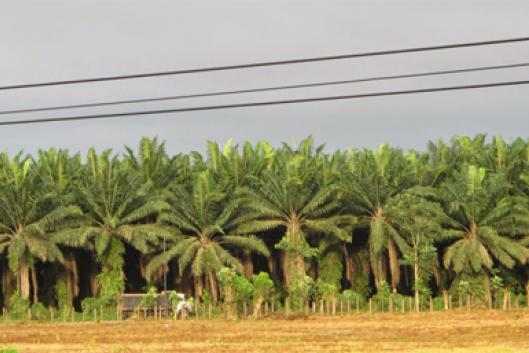Several grassroots organizations in Guatemala released a statement criticizing the public consultation process of the corporate social responsibility principles and criteria of the Roundtable on Sustainable Palm Oil (RSPO). The signatories reported that they had joined together to consider, analyze and discuss the principles and criteria in order to contribute their opinion to the Public Consultation on the RSPO National Interpretation Document, which concluded on 7 December 2014. The statement declares:
“We place importance on any consultation effort that fosters a more respectful relationship between oil palm plantation companies and affected local communities and the different civil society organizations that defend human rights in our country, and that is distanced from the prevailing practice of criminalization of social struggle aimed at ensuring the respect, protection and guarantee of human rights for all Guatemalan citizens.
“The purpose of the public consultation on the RSPO Principles and Criteria National Interpretation Document is to establish the procedures for the certification of oil palm plantation companies operating in Guatemala as ‘sustainable’, in order to facilitate the sale of their products on the international market, in accordance with the standards adopted by palm oil purchasing countries. In this regard, we believe that the certification promoted by the RSPO is a limited and biased framework for the evaluation of oil palm companies, and that both the RSPO and the companies themselves should take clear and determined steps towards framing their actions within a human rights-based approach, as well as the implementation of and full compliance with the ‘Guiding Principles on Business and Human Rights: Implementing the United Nations “Protect, Respect and Remedy” Framework’, endorsed by the UN Human Rights Council in June 2011.
“With regard to the principles and criteria of the RSPO National Interpretation Document which is being reviewed and will serve as the basis for the certification of oil palm plantations already established in our country, we state the following:
“1. The public consultation process has followed a methodology that has not fostered real participation by and consultation of the affected and interested communities. Only four national meetings were held, in Guatemala City, Cobán, Sayaxché and Escuintla; in Sayaxché and Cobán, the meetings were convened by the oil palm plantation companies themselves and were essentially informative rather than consultative; the criticisms voiced by community members at these meetings were not addressed, and in some cases, the community members in attendance were asked to sign blank sheets of paper, which they refused to do.
“2. The direct participation of representatives of the oil palm plantation companies in the National Interpretation process as well as in the RSPO evaluation and certification mechanism results in unbalanced involvement of the companies, making them both judge and jury, which is contradictory to the promotion of a transparent process for the evaluation of their practices in terms of universally accepted principles. As such, we believe that this process and subsequent evaluations should be carried out by independent actors.
“3. The RSPO National Interpretation Document should include the agreements ratified by the state of Guatemala that promote and seek to guarantee the rights of all Guatemalans, and particularly the rights of Indigenous peoples. Therefore, it is especially important to explicitly include ILO Convention 169 concerning Indigenous and Tribal Peoples in Independent Countries, the United Nations Convention against Corruption, the Law on Access to Public Information (Decree 57-2008) and the Peace Agreements signed by the Guatemalan government and the URNG in 1996, enshrined in national legislation through the Framework Law on the Peace Agreements (Decree 52-2005).
“4. We maintain that the interested parties – the affected communities and interested social organizations – have the right to decide whether or not they want the establishment of new oil palm plantations and/or the expansion of existing plantations in their territories. As such, the RSPO National Interpretation Document should explicitly provide the communities with the option of saying ‘no’, rather than considering the only alternatives in the event of disagreements between the companies and the communities affected to be negotiation mechanisms, the establishment of ‘mitigation plans’ and ‘management plans’, or the renunciation of rights on the part of the communities and compensation for the rights of the company.
“5. We further maintain that no certification process is legitimate if it does not take into account the serious denunciations made by the communities affected regarding the theft of lands, the contamination of water sources and waterways, the destruction of ecosystems and the proliferation of pests, as well as the violation of labour rights. It is important for the certification process promoted by the RSPO to incorporate and use as baseline references the denunciations made by the communities affected, as well as the studies conducted by social organizations and academic institutions on the various social, economic and environmental impacts of oil palm plantations.
“6. Finally, we considerate as inadmissible the inclusion of Principle 7 concerning the conditions under which new oil palm plantations could be established in our country. We maintain that no new oil palms plantations should be established in our country, nor should already existing plantations be expanded, give the demonstrated and proven negative impacts in terms of food security and sovereignty, and the environmental, economic and social impacts.”
Comité de Unidad Campesina (CUC)
Consejo Nacional de Desplazados de Guatemala (CONDEG)
Consejo de Instituciones de Desarrollo (COINDE)
Alianza para el Desarrollo Rural Integral (ADRI)
Asociación de Servicios Comunitarios de Salud (ASECSA)
Asociación de Forestería Comunitaria de Guatemala Utz Che'
Asociación Organización Maya para la Paz y el Desarrollo de Sayaxché (MAYAPAZ)
Asociación Civil No Lucrativa para la Defensa y Promoción de los Intereses Relacionados con el Desarrollo Campesino de Occidente (ADECO)
Centro Internacional para Investigaciones en Derechos Humanos (CIIDH)
Colectivo de Estudios Rurales Ixim (CER-Ixim)
Coordinación de ONG’s y Cooperativas (CONGCOOP)
Fundación Guillermo Toriello (FGT)
Federación de Estudiantes de Agronomía de Guatemala (FEAG)
Action Aid Guatemala
OXFAM in Guatemala
TROCAIRE
VSF Justicia Alimentaria Global
Guatemala, 11 December 2014
http://www.albedrio.org/htm/otrosdocs/comunicados/variasorganizaciones-137.html
